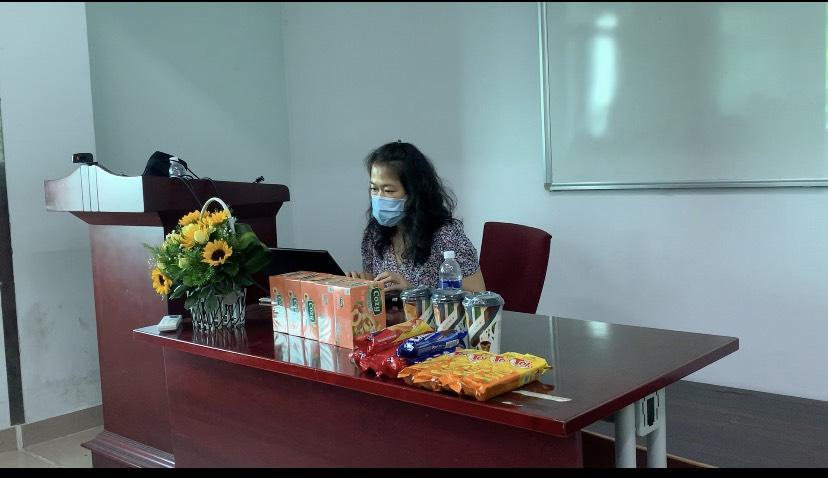In response to the trend of sustainable and environmentally friendly agricultural production, the Faculty of Economics organized the topic "Circular agricultural economic model" with the participation of the collective students majoring in economics K20401, K20401C, K20401T. The seminar took place at 1:00 PM on April 27, 2022, in room A409.
This seminar, besides being highly theoretical and practical, closely relates to the field of Agricultural Economics and Rural Development, a subject that second-year economics students are currently studying. The seminar took place under the connection and guidance of Lecturer Mai Le Thuy Van with guest speaker Mr. Le Minh Vuong - Head of Fertilizer - Earthworm Department - Ninh Thuan Sun and Wind Company.

With more than 7 years of experience in clean industry, organic solid waste treatment and in the field of microbial fertilizer, Mr. Vuong has also won many high awards in innovation competitions in the field of Agriculture.With our extensive experience, issues regarding “Circular agricultural economic model” presented by him in a lively and engaging way attract and persuade. The presentation attracted active participation, with all three classes participating and learning.

Master Mai Le Thuy Van discussed and connected at the thematic talk.

Image of students discussing with Mr. Le Minh Vuong at the thematic reporter session.
Seminar content revolves around the circular agricultural economic model and methods to develop this model from businesses to rural areas. In essence, the circular economy model is a closed model, from resource exploitation - production - distribution - consumption - recovery... always linked together. The opposite of a circular economy is a linear, one-way economy, from exploitation - production - distribution - consumption - waste. In particular, waste from the production and consumption process is not thoroughly treated or reused, leading to depletion of natural resources and serious environmental pollution.
Circular economics is becoming an essential trend worldwide and in Vietnam. Particularly, circular economics plays a crucial role in the closed-loop production of agriculture. Waste and by-products from this process become inputs for other production processes through the application of advanced techniques, biotechnology, and physical chemistry. This enables agriculture to utilize resources efficiently, reduce waste, produce safe and high-quality products, minimize environmental pollution, and protect ecosystems and human health.

Documents and lecture slides are presented live, making it convenient for students to receive knowledge and take notes for the subject. Mr. Vuong reports detailed topics, continuously interacting and asking questions to students. members, encourage you to ask questions and give your opinions. The atmosphere of the thematic reporting session was very exciting and dynamic.

Throughout the seminar, students continually asked questions and expressed their thoughts on this model's relevance in the Vietnamese agricultural market. It was evident that this was an engaging topic, particularly for the younger generation, often referred to as "Gen Z," who were previously disinterested but now sought to explore and learn about new methods.

In addition, the Organizing Committee also prepared many gifts to encourage and encourage the students' spirit of participation in learning. Each group will ask questions to the presenter. The best and most innovative questions will receive gifts from the Organizing Committee. Therefore, the thematic report session was considered exciting, attracting students to express their own opinions and views.
The seminar ended with Mr. Vuong's questions being answered. Every group had their own gifts for their group. This was a very useful seminar as well as helping the students learn a lot of knowledge about subjects in particular and modern agriculture in general. Hopefully there will be more topics like this for the student body to practice their thinking as well as their ability to explore and learn.